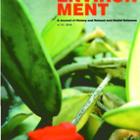Hamblin, Jacob Darwin. “The Vulnerability of Nations: Food Security in the Aftermath of World War II.” Global Environment 10 (2012): 42–65. Republished by the Environment & Society Portal, Multimedia Library. http://www.environmentandsociety.org/node/7576.
The present essay focuses on the scientific approaches emerging from the war that attempted to identify key risks to food security. It shows how a number of scientists in the United States and Britain addressed the problem of human vulnerability in the immediate postwar years, prior to the implementation of the Marshall Plan. The goal of the essay is to highlight how wartime experiences informed notions of food security within international organizations for many decades to come. It encourages scholars to look beyond the East-West and to look in addition to the ways in which American attitudes stood in conflict with European (particularly British) ones in the immediate postwar years. Attitudes in the longlived organization, FAO, were deeply influenced by European attitudes, which in turn were fundamentally shaped by wartime experience, in ways that often stood in stark contrast with American views. We can see these differences in sharp relief when experts debated diet, crops, and the overall approach to managing global food insecurity in the long term.
— Text from The White Horse Press website
All rights reserved. Made available on the Environment & Society Portal for nonprofit educational purposes only, courtesy of Jacob Darwin Hamblin and XL edizioni.


